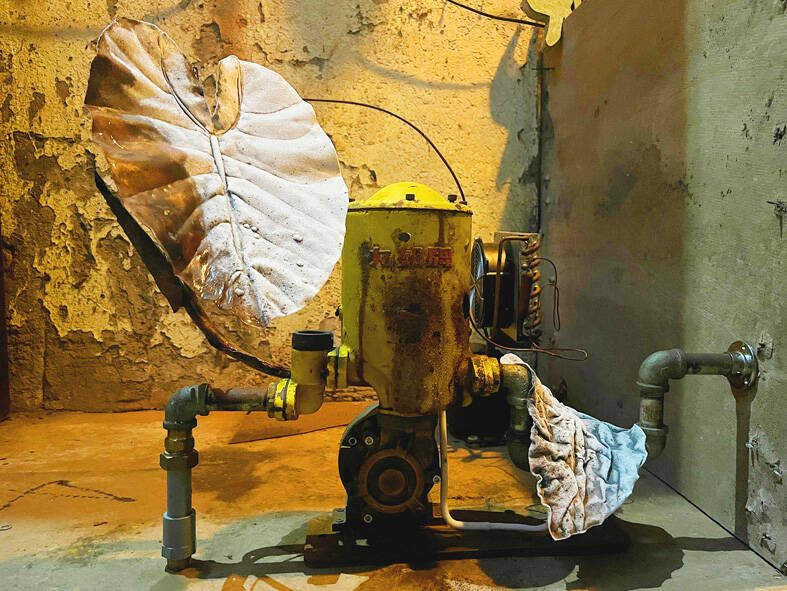Taipei Fine Arts Museum (TFAM) opened a new exhibition on Saturday that showcases works by the nine finalists from this year’s Taipei Art Awards, highlighting the various conflicts they feel about themselves or being in a changing world with ever changing technologies.
During an awards ceremony held on Friday, Chen Zhao-hua (陳肇驊) won the Grand Prize for his work titled At Xiaguirou Mt (在 下圭柔山): NT$550,000 (US$17,110) and an opportunity to hold a solo exhibition at the museum, according to a statement.
Chen’s work recreates a shed used for his artwork, in which two metal giant leaves of a night-scented lily plant are connected to a modified compressor and frosted.

Photo courtesy of the Taipei Fine Arts Museum via CNA
This shows Chen’s true passion for creating art despite the stark working space, the jury said.
The artist’s “mindset [of his passion for arts] is demonstrated by the details of the recreated shed,” the jury said. “The honesty and sophistication of the work displays an artist’s struggle between his work and reality.”
The museum picked a total of nine finalists after receiving a total of 227 submissions, it added.
In addition to the Grand Prize, two of the nine finalists — Wu Wei-ting (吳瑋庭) and Chen Zi-yin (陳姿尹) — received an Honorable Mention from the jury and a cash prize of NT$120,000 each, the museum said.
Wu’s Daily Noise — Level of Illusion (日常雜訊一一錯覺層次) is comprised of several objects created to look like daily items scattering around the exhibition space, such as a piece of Carrara white marble measuring 3cm by 1.5cm by 1cm, titled This is not an Eraser (這不是一個橡皮擦).
Meanwhile, Chen’s Pixel Extension (像素延伸) shows how artificial intelligence (AI) could change what appears to be real but is not, such as a video explaining how AI technology zooms out from the Earth as little more than a spec of dust in an image of the universe.
Chen also displays a photograph of a street with a hole in the sky in her work titled Removal of the Moon (移除月球), which shows the different moon phases, depending where the viewer stands.
The other six finalists, whose works are shown in the exhibition, include Chuang Pei-xin’s (莊培鑫) The Method of Entry (進入的方法), Peng Si-qi’s (彭思錡) House and Universe — Whish (家屋與天地—微軀), and Lee Li-chung’s (李立中) The Legend of Banshanzai (半山傳奇).
The others are Wu Chia-yun’s (吳家昀) Five, Four, Three, Two (無盡), Peng Wei’s (彭韋) Blank (空白), and Lai Jiun-ting’s (賴俊廷) The Human-like Non-human Series: Cognitive Algorithms, Artificial Organs, and Elector Telepresence (似人非人_認知演算。人造器官。電幻知覺).
The exhibition runs until Feb. 18.

Taiwan has received more than US$70 million in royalties as of the end of last year from developing the F-16V jet as countries worldwide purchase or upgrade to this popular model, government and military officials said on Saturday. Taiwan funded the development of the F-16V jet and ended up the sole investor as other countries withdrew from the program. Now the F-16V is increasingly popular and countries must pay Taiwan a percentage in royalties when they purchase new F-16V aircraft or upgrade older F-16 models. The next five years are expected to be the peak for these royalties, with Taiwan potentially earning

POSITIVE DEVELOPMENT: Japan and the US are expected to hold in-depth discussions on Taiwan-related issues during the meeting next month, Japanese sources said The holding of a Japan-US leaders’ meeting ahead of US President Donald Trump’s visit to China is positive news for Taiwan, former Japan-Taiwan Exchange Association representative Hiroyasu Izumi said yesterday. After the Liberal Democratic Party’s landslide victory in Japan’s House of Representatives election, Japanese Prime Minister Sanae Takaichi is scheduled to visit the US next month, where she is to meet with Trump ahead of the US president’s planned visit to China from March 31 to April 2 for a meeting with Chinese President Xi Jinping (習近平). Japan and the US are expected to hold in-depth discussions on Taiwan-related issues during the

‘LIKE-MINDED PARTNER’: Tako van Popta said it would be inappropriate to delay signing the deal with Taiwan because of China, adding he would promote the issue Canadian senators have stressed Taiwan’s importance for international trade and expressed enthusiasm for ensuring the Taiwan-Canada trade cooperation framework agreement is implemented this year. Representative to Canada Harry Tseng (曾厚仁) in an interview with the Central News Agency (CNA) said he was increasingly uneasy about Ottawa’s delays in signing the agreement, especially as Ottawa has warmed toward Beijing. There are “no negotiations left. Not only [is it] initialed, we have three versions of the text ready: English, French and Mandarin,” Tseng said. “That tells you how close we are to the final signature.” Tseng said that he hoped Canadian Prime Minister Mark Carney

STAY IN YOUR LANE: As the US and Israel attack Iran, the ministry has warned China not to overstep by including Taiwanese citizens in its evacuation orders The Ministry of Foreign Affairs (MOFA) yesterday rebuked a statement by China’s embassy in Israel that it would evacuate Taiwanese holders of Chinese travel documents from Israel amid the latter’s escalating conflict with Iran. Tensions have risen across the Middle East in the wake of US and Israeli airstrikes on Iran beginning Saturday. China subsequently issued an evacuation notice for its citizens. In a news release, the Chinese embassy in Israel said holders of “Taiwan compatriot permits (台胞證)” issued to Taiwanese nationals by Chinese authorities for travel to China — could register for evacuation to Egypt. In Taipei, the ministry yesterday said Taiwan